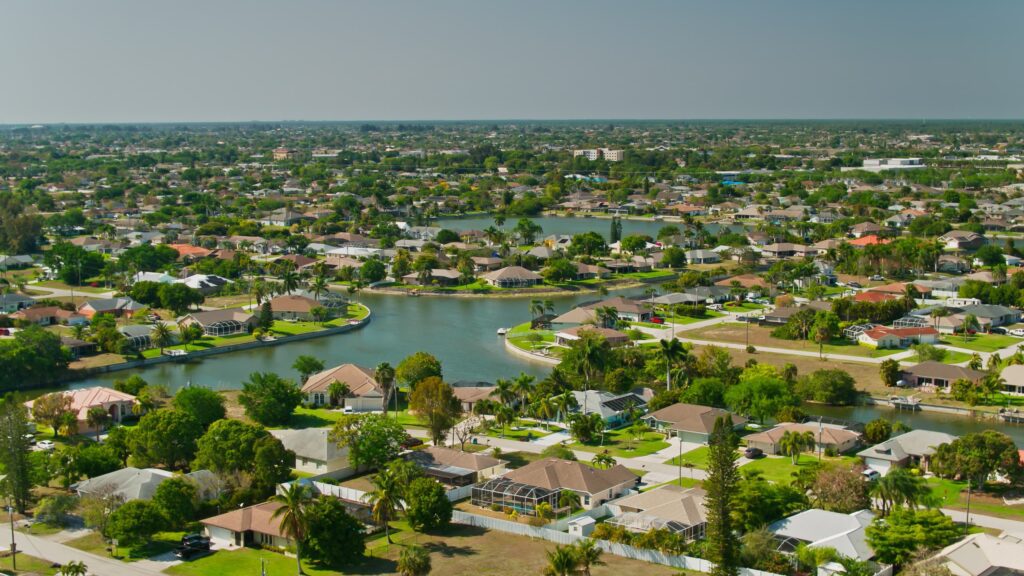Cape Coral Housing Market: Transitioning, Not Crashing – A Closer Look at Recent Trends
The Cape Coral real estate market has recently been labeled “the worst housing market in America” by The Wall Street Journal on June 30, a headline that sparked concern among homeowners, buyers, and Realtors alike. This designation, based on a significant price decline following the COVID-19 pandemic housing boom, paints a picture of a market in crisis. However, local Realtors and experts argue that this narrative misses critical context, revealing instead that Cape Coral is experiencing a natural, healthy market correction rather than a collapse.
Understanding the Pandemic Era Boom and Correction in Cape Coral
During the early years of the COVID-19 pandemic, Cape Coral-Fort Myers metro area home prices surged dramatically. According to an analysis by Homes.com referenced by The Wall Street Journal, prices jumped 75% to a median of $419,000 as buyers rushed to purchase homes often sight unseen.
Since then, prices have retracted by approximately 11% over the past two years ending in May, most impacting recent buyers who purchased near the peak. This has led to about 7.8% of Cape Coral homeowners being underwater on their mortgages—meaning they owe more than their home’s market value—a figure labeled the highest in the United States.
Local Realtors Respond: “A Market in Transition, Not in Collapse”
Southwest Florida Realtors contest the bleak portrayal, emphasizing the need to view recent trends within a broader, more balanced context.
Key Perspectives from Industry Leaders:
- James Sommers, a veteran Realtor with RE/MAX Trend in Cape Coral and Fort Myers, describes the WSJ headline as “clickbait” and “a bit negative,” acknowledging that while the market is indeed correcting, it is not collapsing.
- Karen Borrelli, President of the Royal Palm Coast Realtor Association and the Florida Gulf Coast Multiple Listing Service (FGCMLS), criticized The Wall Street Journal for focusing too heavily on the peak pandemic frenzy without recognizing longer-term stability. In a letter to the publication, she stated:
“Such a characterization lacks critical context and overlooks the broader dynamics shaping our regional real estate trends.”
[link-whisper-related-posts]
Actual Market Data Paints a More Balanced Picture
Median Sale Price and Inventory Trends
- Median sale price in Cape Coral rose modestly from $355,000 in October 2021 to $361,975 in June 2023, signaling relative price stability outside of the pandemic spike.
- Inventory more than tripled from 773 homes to 3,046 homes during the same period, equating to about 7.3 months of housing inventory—shifting market power increasingly toward buyers.
- For context, a balanced housing market typically has four to six months of inventory, indicating that while buyers have more options, the market is not distressed.
Regional Overview: Lee County Housing Market
- Including areas such as Fort Myers, Sanibel, Estero, Bonita Springs, and Lehigh Acres, the broader Lee County market reflected similar dynamics:
- Median sale prices increased from $365,000 to $380,000 between October 2021 and June 2023.
- Inventory expanded sharply from 1,997 to 8,204 homes for sale.
This significant rise in available homes points to a transition from a tight seller’s market to a more balanced environment, allowing buyers increased negotiating leverage.
Factors Influencing Demand and Market Dynamics
Several elements have influenced real estate activity and buyer behavior in Cape Coral:
- Higher insurance rates and recent hurricanes contributed to softening demand, intensifying caution among potential buyers.
- Local Realtors note that seasonal factors such as the slower summer market could amplify appearances of softness, evidenced by increased For Sale signs and less active open houses.
- Unlike the 2008 subprime mortgage crisis, when Cape Coral was the epicenter of the housing meltdown, recent foreclosure activity remains minimal. The FGCMLS reports 27 homes listed as foreclosures and 76 foreclosure sales in the past year, far lower than during the last economic downturn.
What This Means for Buyers and Sellers
Buyers:
- Increased inventory provides a wider selection of homes.
- More negotiating power due to less competition compared to the pandemic peak.
- Potential to secure properties at more realistic, stable prices.
Sellers:
- Need to price homes competitively due to higher supply.
- Must prepare for a market correction aligning values more closely with broader economic conditions.
- Should avoid panic selling and instead strategize with current market data.
Conclusion: Cape Coral’s Housing Market Is in Transition
Despite headlines declaring Cape Coral’s real estate market as the "worst in America," local experts contend it is undergoing a necessary, healthy market correction after unprecedented pandemic-driven growth. Increased inventory and modest price adjustments signify a market moving toward balance—not collapse.
As Karen Borrelli summarizes,
“The Southwest Florida housing market, particularly Cape Coral, is transitioning from a historically tight seller’s market into one where buyers have more choice and negotiating power. This is a natural correction, not a collapse.”
Homebuyers and sellers should approach this period as an opportunity to align expectations with a more stable market environment in one of Florida’s most dynamic regions.
For more detailed data on Cape Coral’s housing market and updates on Florida real estate trends, visit the Royal Palm Coast Realtor Association and Florida Gulf Coast Multiple Listing Service.
Related Resources:
- Understanding Housing Market Corrections
- How Insurance Costs Affect Real Estate
- Impact of Hurricanes on Florida Housing Markets
Stay informed with the latest Cape Coral real estate insights for smarter buying and selling decisions.


